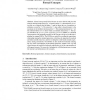234 search results - page 12 / 47 » Rough Set Approximations in Formal Concept Analysis |
FSS
2008
13 years 7 months ago
2008
Classical consistency degree has some limitations for measuring the consistency of a decision table, in which the lower approximation of a target decision is only taken into consi...
APSEC
2000
IEEE
14 years 3 days ago
2000
IEEE
It has been recognised that formal methods are useful as a modelling tool in requirements engineering. Specification languages such as Z permit the precise and unambiguous modell...
DASFAA
2005
IEEE
14 years 1 months ago
2005
IEEE
Formal concept analysis has become an active field of study for data analysis and knowledge discovery. A formal concept C is determined by its extent (the set of objects that fall...
CLA
2006
13 years 9 months ago
2006
Formal Concept Analysis (FCA) considers attributes as a non-ordered set. This is appropriate when the data set is not structured. When an attribute taxonomy exists, existing techni...
EUSFLAT
2009
13 years 5 months ago
2009
Abstract-- An L-fuzzy context is a triple consisting of a set of objects, a set of attributes and an L-fuzzy binary relation between them. An l-cut is a classical context over the ...

